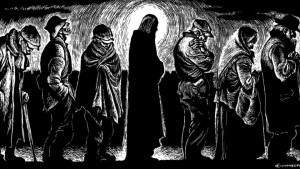
Written on the back of a menu during the Great Depression, “O YOUNG AND FEARLESS PROPHET” is a bold inventory of societal ills — from merciless poverty (the result of “our greed”), to false patriotism that fuels militarism. Just as bold is the portrait of Jesus, “young and fearless,” who remained steadfast, even in the face of public scorn, condemnation, torture, death.
This is a rare hymn, acknowledging how hard it can be to challenge the status quo in our own time. Taking an unpopular stand can mean social ostracism, losing face or losing a job. In extreme circumstances, doing the right thing can mean losing freedom. It can mean death. Mindful of all we risk, we’re tempted to keep our eyes averted and our mouths shut.
S. RALPH HARLOW, SOCIAL GOSPEL ADVOCATE

Born in Boston, Samuel Ralph Harlow (1885-1972) graduated from Harvard, Columbia U., and Hartford Theological Seminary, was ordained as a Congregational minister, then taught at the International College in Smyrna, Turkey. During WWI, he worked for U.S. forces at a YMCA in France, then, for three years, served as the director of a student missionary service in the Near East.
In 1923 he became a professor of religion and social ethics at Smith College in Northampton, Massachusetts. He remained in that position for thirty years.
Harlow was a socialist, advocate of the Social Gospel, a pacifist who felt compelled to modify his beliefs when Hitler came to power, and later, an activist in the Civil Rights movement.
 Controversial from the start, his hymn about braving the threat of rejection was initially watered down in order not to embarrass prosperous churchgoers. One of the original verses calling on Christians to protest “our greed for wealth while others starve” was considered so objectionable that it was censored by the Methodist hymnal committee and left out of the 1935 and 1966 editions.
Controversial from the start, his hymn about braving the threat of rejection was initially watered down in order not to embarrass prosperous churchgoers. One of the original verses calling on Christians to protest “our greed for wealth while others starve” was considered so objectionable that it was censored by the Methodist hymnal committee and left out of the 1935 and 1966 editions.
In correspondence with the committee, Dr. Harlow was told that “the church is not ready to sing that yet.” Harlow responded that the rejected verse wasn’t nearly as radical as the Magnificat (Luke 1: 46-55)! Eventually, the brave verse was included in the 1989 hymnal.
Jesus said — if you would follow me, do what I do (John 14:12). He set the example of a fearless life, in which our thoughts and actions are courageously less prone to please the crowd and more prone to please our loving, justice-seeking God.
 Our courage, like the courage of those who compile hymnals, waxes and wanes. How hard it is to hear the challenge of Jesus “above our noisy day.”
Our courage, like the courage of those who compile hymnals, waxes and wanes. How hard it is to hear the challenge of Jesus “above our noisy day.”
Joining our voices in this hymn, we can almost feel our confidence growing, our spines straightening. Inspired by the example of Jesus, we feel ourselves stirred up enough to do the right thing.
TO GO DEEPER
S. Ralph Harlow website, maintained by Susanna Harlow Omaç, granddaughter of the hymnist.
“History of Hymns: ‘O Young and Fearless Prophet’” by C. Michael Hawn, Dec. 2013, UMC Discipleship Ministries
“O Young and Fearless Prophet” Music, lyrics, and background on Hymnary website
NYT Obituary: “Dr. S. Ralph Harlow Dies at 87; Missionary and College Teacher,” NYT, August 23, 1972.
“O Young and Fearless Prophet” discussed on blog by Rev. Dr. Joseph McBrayer. It includes a vimeo of the United Methodist pastor playing and singing his arrangement of the hymn (accompanied by guitar and harmonica), set to the PASSION CHORALE.
